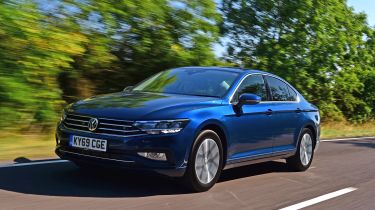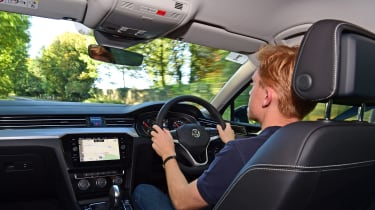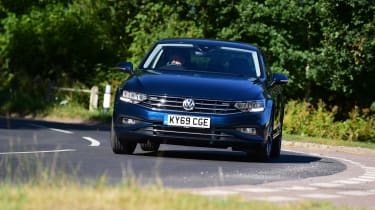Volkswagen Passat (2014-2021) - Engines, performance and drive
Diesel engines are as accomplished as ever, the petrols are interesting and the GTE is an intriguing performance eco model

This is an archived review of the 2015-2021 Volkswagen Passat. If you are interested in information about the engines in the latest Volkswagen Passat, or news about the latest Volkswagen models, please follow the links provided.
The smooth, refined Passat has long been known for its fuss-free, grown-up drive, and the eighth-generation model is the most premium and executive-style variant yet. However, thanks to its lightweight MQB platform, which is stiffer and has a lower centre of gravity, it also handles more dynamically than any Passat before it.
Similar to the VW Golf, the Passat is very easy to drive, with precise and accurate steering that doesn't offer much feel, but compensates with easy placement in corners. Because there’s less weight, the Passat turns more confidently into bends and has more agility than previous models. There’s lots of grip and traction, too.
The cushioned ride that’s become a trademark of the Passat is present, while running refinement is improved and the lack of road noise combines with low levels of wind noise to make the car extremely quiet on the move.
Improved body control adds to the comfort – passengers are rocked and rolled less, with the Passat’s greater composure adding to its smooth, unruffled feel. At speed on a motorway the Passat is more comfortable than it has ever been, and more than a match for a genuine premium-badged car. Its classy styling is now fully matched by a grown-up, classy drive.
Used - available now

2020 MINI
5-Door Hatch
26,883 milesAutomaticPetrol2.0L
Cash £17,450
2020 BMW
X1
28,241 milesManualPetrol1.5L
Cash £17,206
2022 SEAT
Tarraco
32,000 milesAutomaticDiesel2.0L
Cash £22,884
2025 Volkswagen
T-Roc
25,607 milesAutomaticPetrol1.5L
Cash £24,697The Passat GTE has a name and styling cues to invoke ideas of VW's GTI badge, but it doesn't feel all that sporty in corners. The hybrid set-up’s extra weight can be felt, and there’s plenty of body roll. Think of the GTE as a Passat GT with hybrid drive rather than a GTI, and it makes more sense. It’s a quiet cruiser and is comfortable on long trips, while the suspension soaks up bumps reasonably well, although not quite as good as the softer standard car.
Engines
Of the diesel engines, the 118bhp 1.6-litre TDI is a smooth, refined engine that boasts similar power to previous entry-level 2.0-litre TDI units. It’s been optimised to give linear, torquey response: 250Nm of pulling power is impressively available across a broad rev range. A 0-62mph time of 11.3 seconds (in SE saloon format) means it’s no rocket ship against the clock, but it's swift enough not to be embarrassed. The 1.6 TDI is only available with a seven-speed DSG dual-clutch automatic.
All the diesel engines are fitted with an SCR Selective Catalytic Reduction filter that minimises NOx emissions through the addition of AdBlue fluid. That means all models feature an AdBlue filler next to the fuel filler; the Passat's electronics will warn when the 13-litre AdBlue tank needs refilling.
The 2.0 TDI 150 is the core Volkswagen Passat engine. Its 148bhp output is backed up by, again, a broad spread of torque: 340Nm of pulling power is again available between 1,750-3,500rpm. This engine comes with either a six-speed manual or a DSG dual-clutch auto; in this instance, a seven-speed unit. 0-62mph takes 8.7 seconds in both manual and automatic guise and the top speed is 136mph.
The more powerful 2.0-litre TDI 190 produces 187bhp and a full 400Nm of torque between 1,750-3,000rpm. Against the clock, it’s a swift engine: 0-62mph takes 7.7 seconds with the standard seven-speed DSG. That’s warm hatch territory and a top speed of 147mph is pretty impressive as well. This engine is available in combination with SEL trim and above.
VW’s impressive-sounding 2.0 BiTDI motor produces 237bhp at 4,000rpm and a huge 500Nm slug of torque from 1,750-2,500rpm. Befitting its range-topping status, this engine is only available with a DSG dual-clutch seven-speed automatic. Volkswagen also only offers this engine with 4Motion all-wheel drive, which is sensible given the amount of pulling power it boasts. 0-62mph takes a hot hatch-rivalling 6.1 seconds, while the top speed is just shy of 150mph.
The tech-laden Passat GTE plug-in hybrid is the most advanced Passat ever sold. It mates a 1.4 TSI turbo petrol engine with a powerful electric motor and high-capacity plug-in batteries, for a system total power of 215bhp and system torque of 400Nm. This is good for 0-62mph in 7.6 seconds and a top speed of 140mph.
The GTE combines performance and economy; it can run solely on electric power for up to 30 miles at lower speeds if the battery is fully charged and can shuffle between its two power sources to deliver respectable fuel economy on longer journeys.
The GTE comes with a number of driving modes that alter steering and throttle response, along with different configurations of engine and battery performance. The Passat is quite lively in GTE mode, and synthetic engine sounds are played in the cabin to enhance this feel. However, the Passat isn’t quite the performance powerhouse that GTE mode would lead you to believe, with brisk rather than explosive acceleration.
Petrol engine choice used to include 1.4-, 1.8- and 2.0-litre TSI units, but now the choice is either VW's great 1.5 TSI EVO 150PS, or the more powerful 2.0 TSI 190PS. The former uses VW’s cylinder-deactivation technology, so it shuts down two cylinders when you’re cruising along on part throttle, in a bid to improve fuel efficiency.
Thanks to it having 250Nm of torque from as little as 1,500rpm, you can almost drive it like a diesel, with early upshifts. It’s smooth, too, and while you may hear a slight resonance when the cylinders shut down, for the most part you’ll only become aware of it kicking in when the indicator on the instrument panel lights up.










